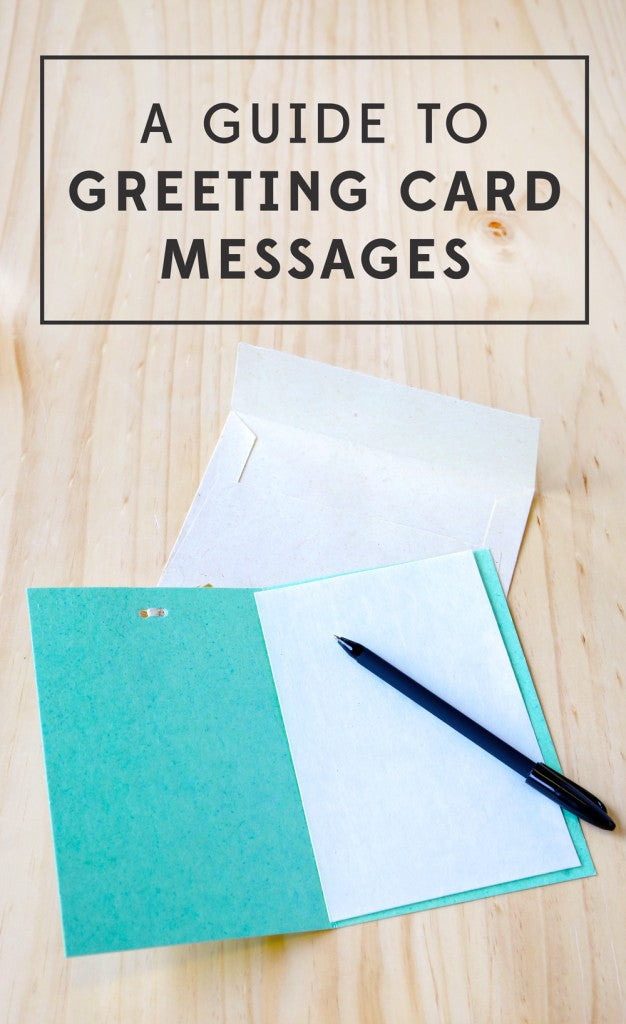6 Simple Steps to Find the Perfect Words

Ever at a loss for words?

We all have a hard time expressing our feelings aloud sometimes, especially in emotional moments. You try to find that perfect opportunity to speak, you muster up the courage, only to stumble over words, and you leave the conversation feeling like you didn’t get the point across quite in the way you had wanted. By jotting down your thoughts inside a card, you can take your time with it—and feel confident that your words express exactly what you mean to say.
Even if you’re not a practiced writer, there are some steps that can make writing sincerely a heck of a lot easier:
Step one: How do you feel?
Think about the overall feeling that you have about this occasion/ moment. Are you proud, sad, in love? Decide on just one feeling and identify that as your focus for the message.
Step two: Choose an angle.
Are you aiming to be light-hearted, funny, neutral, or serious? Some combination of those, perhaps? Some occasions lend themselves better to certain angles than others (it may not be appropriate to write a funny card for a funeral), but try to mix it up and find the balance that best captures your unique personality.
Step three: Pick out a card.
The most important thing here is to stay true to yourself! Choose a card that speaks to YOU, and then also consider the recipient’s interests and tastes. Do you and the recipient have an inside joke or common interest? And as you look at each card, consider, “Does this match the feeling and angle I’m trying to express?” The key here is to use your best judgement and listen to your intuition.
Step four: Practice.
Get out your scrap paper, because it’s practice time! Take the pressure off and give yourself some space to play around with wording. A lot of people skip this step and set pen straight to card, but for the most thoughtful message possible, it’s best to take a few stabs at it and then go with the version you like best.
Step five: Eliminate abstractions.

First let’s talk about: what are abstractions? In writing terms, an abstraction is an intangible concept or idea (like “love” and “hate.”) This may seem like a contradiction to step one, but finding more tactile and unique words that connote the same idea as your feeling words can often make your message sound more sincere. Common words can sometimes come across as cliché, but applying an image or action word can make for an interesting expression!
For example:
Instead of, “I love you.” Try something with more concrete imagery or action. “You make my heart smile.” Make is an active word, while heart and smile are both images. Here are some more examples, delivering the same message in different tones:
Playful: “You make me feel all warm & fuzzy.”
Serious: “You bring out the best in me.”
**An Exception to the Rule**
Messages of sympathy. One of the hardest times to find the right words is after a loved one has passed away. These are moments when the right words can bring a lot of comfort to someone who feels vulnerable and lost. This sentiment is also largely influenced by your relationship with the deceased, but even if it’s a person you never met, you can still offer your support to the family. While using metaphors can bring other messages to life, it’s best to avoid flowery language when expressing sympathy.
For example:
Instead of, “My condolences”, try some of these options. If it was someone you knew well, try something more heartfelt and personal:
Uplifting: “I will always cherish the memories of NAME.” If it’s comfortable, you could list a few of the best times you spent together, as a way to celebrate the life of that person.
Comforting: “We were so lucky to have had NAME in our lives. I will miss HIM/HER.” If you never met the deceased, try shifting the focus more on the living: “Even though I never met your MOM, she must’ve been an incredible woman to have raised a DAUGHTER like you. Please know that your family is in my thoughts and I am here for you, whatever you need.”
**When All Else Fails**
Play with cliché.
Don’t feel like you have to take yourself too seriously. Sometimes, the best cards are the ones that give in to the writer’s block and fall back on familiar old rhymes and sayings. If sincere sentiment truly escapes you, try plugging in new words to the classic “Roses are red, violets are blue” rhyme. Try a quick haiku. While closed-form poems can sometimes feel like solving a thousand piece puzzle, some structure can be good for getting the creative juices flowing, and the results can often be hilariously funny.
Step Six: Write in your card.
Choose a pen that you’re comfortable using. If your card is glossy, use a ball-point pen to help prevent smudging or smearing. Once you have your pen, go ahead and scribe your message with confidence! Don’t forget to sign your name at the bottom, and if you want to include the date, that can bring a wonderful nostalgic feeling for people who hang onto their cards for years to come. Cards can be for more than just a moment. They can be something to keep forever, as a memory, so take your time and have fun with it. Looking back on the card, years from now, will be all the more meaningful if you do.









Comments